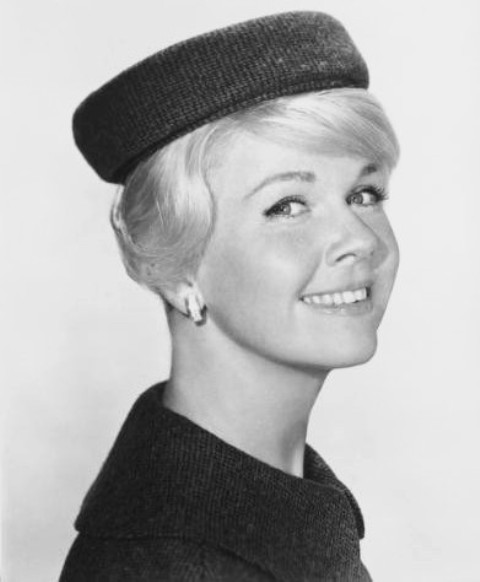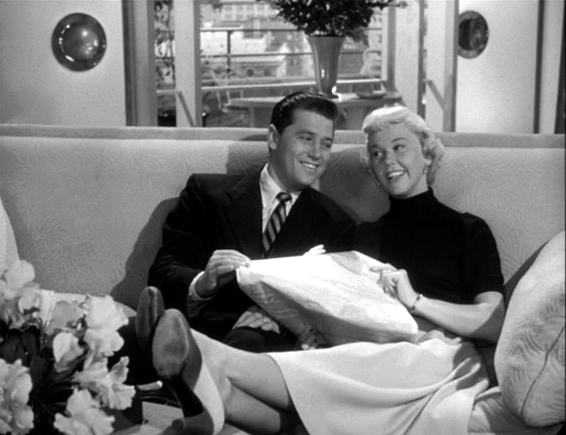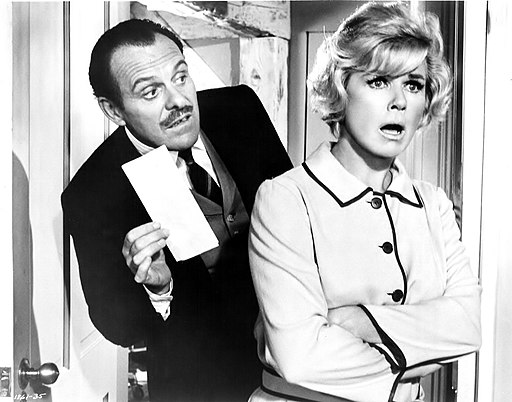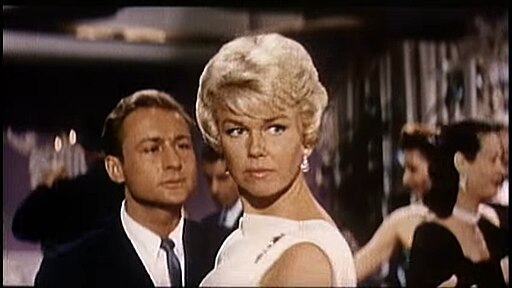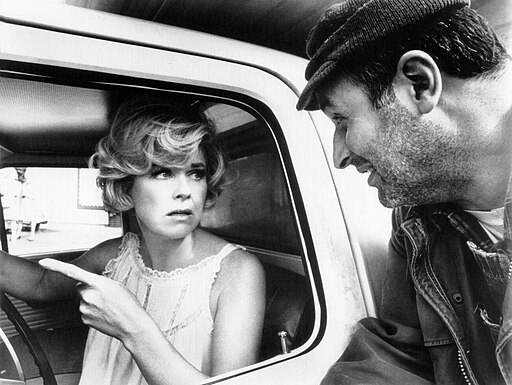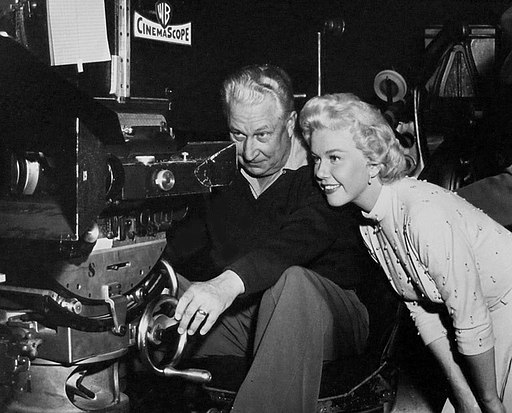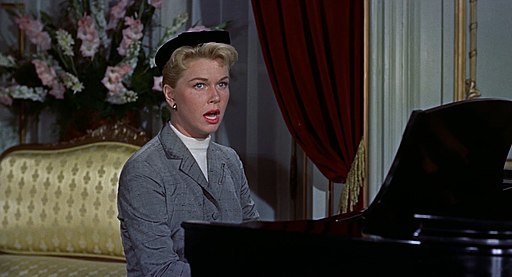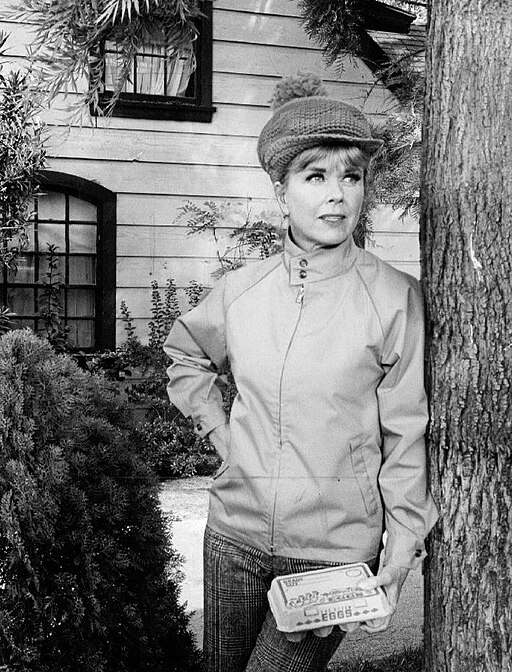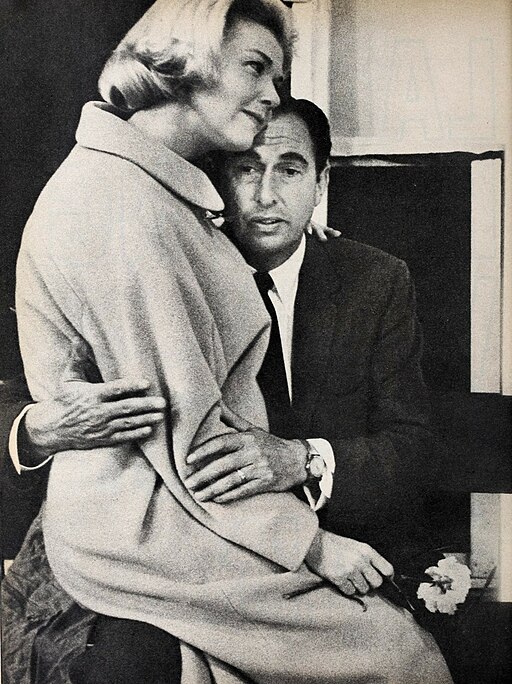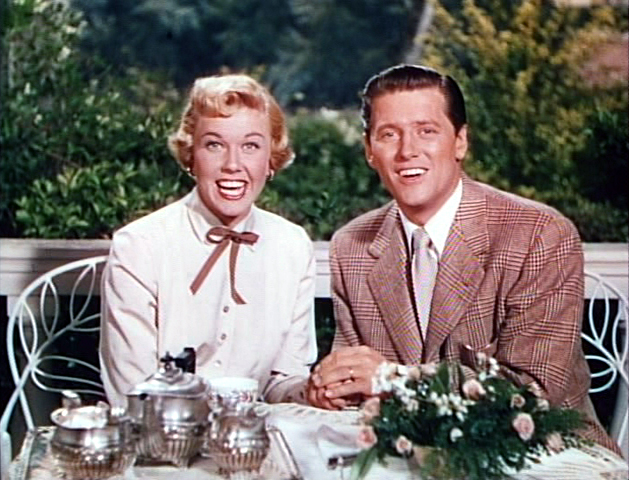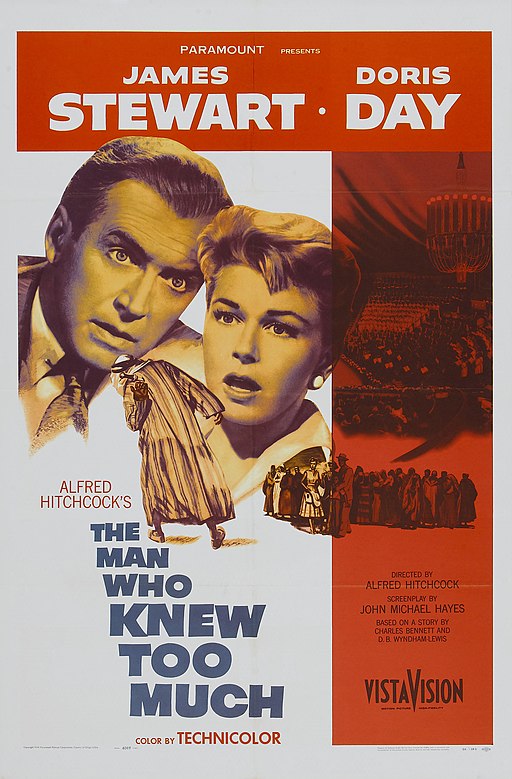Doris Day
back| Full Name | Doris Mary Anne Kappelhoff |
| Stage Name | Doris Day |
| Born | April 3, 1922 |
| Birthplace | Cincinnati, Ohio, United States |
| Died | May 13, 2019 |
| Buried | Doris Day was cremated, and it was reported that there would be no grave marker, as per her wishes. |
| Married to | Al Jorden (m. 1941–1943) - George Weidler (m. 1946–1949) - Martin Melcher (m. 1951–1968, his death) - Barry Comden (m. 1976–1981) |
| Children | Terry Melcher (1942–2004) |
| Notable films | Pillow Talk (1959) - Calamity Jane (1953) - The Man Who Knew Too Much (1956) - Love Me or leave Me (1955) - Move Over, Darling (1963) |
Doris Day
The Iconic Girl Nex Door
Doris Day was renowned for her wholesome, vivacious image, which was a defining feature of her film career in the 1950s and 1960s. She was also a talented singer, with her rendition of "Que Sera, Sera (Whatever Will Be, Will Be)" becoming one of her biggest hits. Beyond her entertainment career, Day was an ardent animal welfare activist.
Doris Day was often affectionately nicknamed "The Girl Next Door" due to her wholesome, approachable image and her portrayal of characters that often embodied these qualities.
Related
Doris Day (1922 – 2019)
Biography and Career Overview
Doris Day was born Doris Mary Anne Kappelhoff on April 3, 1922, in Cincinnati, Ohio. She was the youngest of three siblings in a family of German-American descent. Her parents separated when she was young, primarily due to her father's alleged infidelity.
Doris showed an early interest in dance and music. She formed a dancing duo with Jerry Doherty and won a local talent contest, which led to a performance in Hollywood. However, her dancing career was tragically cut short at age 13 when she was involved in a car accident, severely injuring her right leg.
While recovering, Day started to sing along with the radio and discovered a talent that would define her career. She began vocal lessons, quickly showing a natural aptitude for music. Her mother, recognizing her talent, helped her find work as a vocalist.
Path Towards Success
Day's singing career began with local Cincinnati radio stations and band performances. At 16, she joined Les Brown's band with a rendition of "Day After Day," which became her first hit recording. Her sultry, emotion-laden voice captivated audiences, leading to her first big hit, "Sentimental Journey," in 1945. This song became an anthem for American troops returning from World War II.
Hollywood Career
Day's transition to film came when she was approached to star in "Romance on the High Seas" in 1948. Her performance was a hit, and it launched a film career that spanned over two decades. She became known for her roles in romantic comedies, musicals, and dramatic films. Some of her most notable movies include "Calamity Jane," "Pillow Talk," and "The Man Who Knew Too Much." Her song "Que Sera, Sera," from "The Man Who Knew Too Much," became her signature tune.
Personal Life and Marriages
Doris Day's personal life was marked by turbulence and heartache, contrasting her sunny professional persona. She married four times:
- Al Jorden (1941–1943): A trombonist, their marriage was troubled and ended due to his abusive behavior.
- George Weidler (1946–1949): A saxophonist, this marriage also ended in divorce.
- Martin Melcher (1951–1968): Her longest marriage, which ended with Melcher's death. Unbeknownst to Day, Melcher had squandered her earnings, leaving her in debt.
- Barry Comden (1976–1981): They divorced, reportedly due in part to Comden's discomfort with Day's devotion to her animals.
Day had one child, Terry Melcher, with her first husband, Al Jorden. Terry became a successful music producer but tragically passed away in 2004.
Passions
Apart from her entertainment career, Day was a passionate animal welfare advocate. She founded the Doris Day Animal Foundation and the Doris Day Animal League, focusing on animal rescue and welfare.
Death and Legacy
Doris Day died on May 13, 2019, at the age of 97. The cause of death was pneumonia. She spent her last years in Carmel-by-the-Sea, California, living a private life away from the Hollywood spotlight. Day left a legacy as one of the most beloved and enduring figures in the American entertainment industry, remembered for her radiant screen presence, distinctive voice, and humanitarian efforts. Her death marked the end of an era, but her films and music continue to charm audiences worldwide.
Doris Day sings "Que Sera, Sera" from "The Man Who Knew Too Much" (1956):
Notable Movies starring Doris Day:
1940s
- 1948: "Romance on the High Seas"
Synopsis: Day's film debut, a musical romantic comedy where she plays a woman who takes a cruise, leading to a case of mistaken identity and romantic complications.
1950s
- 1950: "Young Man with a Horn"
Synopsis: Day stars as a kind-hearted singer in a drama about a troubled trumpet player's rise and fall.
- 1951: "Storm Warning"
Synopsis: A film noir about the Ku Klux Klan, where Day plays the sister-in-law of a man involved with the Klan.
- 1953: "Calamity Jane"
Synopsis: A musical Western where Day portrays the titular frontierswoman, known for the song "Secret Love."
- 1955: "Love Me or Leave Me"
Synopsis: A biographical film in which Day plays singer Ruth Etting, chronicling her career and turbulent marriage.
- 1956: "The Man Who Knew Too Much"
Synopsis: An Alfred Hitchcock thriller where Day plays the wife of a man inadvertently caught up in an assassination plot.
- 1957: "The Pajama Game"
Synopsis: A musical comedy set in a pajama factory, where Day's character is involved in labor disputes and romance.
- 1958: "Teacher's Pet"
Synopsis: Day portrays a journalism teacher who clashes with a newspaper editor enrolled in her class.
- 1959: "Pillow Talk"
Synopsis: A romantic comedy where Day and Rock Hudson share a party line, leading to romantic entanglements.
1960s
- 1960: "Please Don't Eat the Daisies"
Synopsis: A light-hearted comedy where Day plays a housewife dealing with her husband's newfound success as a theater critic.
- 1962: "That Touch of Mink"
Synopsis: A romantic comedy featuring Day as a woman wooed by a wealthy businessman, played by Cary Grant.
- 1963: "Move Over, Darling"
Synopsis: Day plays a woman who returns after being stranded on an island for years, only to find her husband has remarried.
- 1963: "The Thrill of It All"
Synopsis: A comedy where Day's character becomes a famous TV spokesperson, disrupting her family life.
- 1964: "Send Me No Flowers"
Synopsis: A comedy about a hypochondriac (played by Rock Hudson) who mistakenly believes he is dying and tries to find a new husband for his wife (Day).
- 1966: "The Glass Bottom Boat"
Synopsis: Day stars in this comedy as a woman suspected of being a Russian spy.
- 1968: "With Six You Get Eggroll"
Synopsis: A family comedy where Day's character, a widow, marries a widower, leading to a blended family dynamic.
The distinctive Acting Style of Doris Day:
Doris Day's acting style was a distinctive amalgamation of natural charm, emotional sincerity, and a bright, effervescent screen presence. Her performances often exuded a wholesome, girl-next-door quality that became her trademark in Hollywood. Here's a more detailed analysis of her acting style:
Approachable and Relatable
Day had a unique ability to portray characters that were both aspirational and relatable. She often played roles of strong, independent women, yet they were grounded in a reality that resonated with the average moviegoer. Her portrayals were imbued with a sense of genuineness and authenticity, making her characters feel like someone you could know in real life.
Versatility
While she is often remembered for her roles in romantic comedies and musicals, Day's range as an actress was quite broad. She could seamlessly transition from light-hearted roles in films like "Pillow Talk" to more dramatic and intense performances, such as in "Love Me or Leave Me" and "Midnight Lace." This versatility allowed her to portray a variety of characters across different genres, showcasing her ability to adapt to the demands of different types of storytelling.
Emotional Depth and Sincerity
Day had the ability to convey deep emotions convincingly. In her dramatic roles, she could portray vulnerability and inner turmoil, bringing an emotional depth that added layers to her characters. In musicals, her emotive singing voice was an extension of her acting, allowing her to express her character's feelings through song in a way that was both powerful and moving.
Comic Timing and Physical Comedy
Day's performances in comedies were marked by impeccable timing and a flair for physical comedy. Her facial expressions, body language, and comedic timing were spot on, contributing to some memorable and endearing moments in her films. She had a knack for delivering witty dialogue with a natural ease, making her a standout in the romantic comedy genre.
Screen Presence and Chemistry
Day had an undeniable screen presence, often lighting up the screen with her smile and energy. She also had remarkable chemistry with her co-stars, notably Rock Hudson and James Garner, which added a dynamic and engaging aspect to her films. This chemistry was crucial in her romantic comedies, where the interplay and rapport with her co-star were key elements of the film's appeal.
Contribution to Film and Cultural Impact
Day's acting style, characterized by her wholesome image and versatility, had a significant impact on the film industry and popular culture. She represented a certain ideal of American femininity in the 1950s and 1960s, becoming both a symbol of her time and a timeless icon. Her roles often reflected and subtly challenged the societal norms of the era, making her an important figure in the representation of women in cinema.
Memorable Quotes from Doris day:
From Her Films:
"Pillow Talk" (1959):
- "Mr. Allen, this may come as a shock to you, but there are some men who don't end every sentence with a proposition."
"Calamity Jane" (1953):
- "I figure if a girl wants to be a legend, she should just go ahead and be one."
"Love Me or Leave Me" (1955):
- "You think because you made a little money, you can get a new hairdo and some expensive clothes and turn yourself into a lady. But you can't, because you'll never be anything but a common frump whose father lived over a grocery store and whose mother took in washing."
Personal Quotes:
On Her Career:
- "I've never met an animal I didn't like, and I can't say the same thing about people."
On Her Image:
- "I like to be with happy people, and I like to make people happy."
Reflecting on Life:
- "If I can do it, you can do it. Anybody can."
On Love:
- "The really frightening thing about middle age is the knowledge that you'll grow out of it."
Her Philosophy:
- "I have always said that if I could tell the story of a whole life in words, I wouldn't need to lug a camera around."
On Happiness:
- "Gratitude is riches. Complaint is poverty."
Continuing Success with The Doris Day Show
"The Doris Day Show" was an American sitcom that showcased the multi-faceted talents of Doris Day, who was already a well-established movie star and singer when the show aired. Here's an overview of the series:
Basic Information
- Original Run: The show aired from 1968 to 1973.
- Network: CBS
- Seasons: Five seasons
- Episodes: A total of 128 episodes
Plot and Format Evolution
The unique aspect of "The Doris Day Show" was its significant changes in format and setting over its five-season run, reflecting Day's versatile talent and the changing television landscape of the time.
- Seasons 1 and 2: Doris Martin (played by Doris Day) is a widowed mother living on her father's ranch in Mill Valley, California, with her two young sons, Toby and Billy. The show focused on her life as she balanced her family with her job as a secretary at Today's World magazine in San Francisco.
- Season 3: The show shifted focus, with Doris beginning a new job as a reporter at the magazine, highlighting her career alongside her personal life. The rural setting was gradually phased out.
- Seasons 4 and 5: The later seasons saw another shift, with Doris becoming a single, independent career woman. The series dropped the rural setting and her children from the storylines, focusing on her urban life and work in San Francisco.
Reception and Legacy
- Initial Reception: The show had a moderately successful run, with its initial family-centric episodes garnering appreciation for their wholesome content.
- Cultural Impact: "The Doris Day Show" is often remembered for its portrayal of an evolving woman's role in society. Doris' character transitioned from a rural, family-focused woman to an independent, career-oriented figure, mirroring the changing status of women in the late 1960s and early 1970s.
- Legacy: While the show never reached the heights of Day's film career, it remains a notable part of her legacy, showcasing her adaptability and charm in a television format.
Doris Day's Role
Doris Day's involvement was a significant draw for the audience. Her warm and engaging presence, honed through years of film experience, made the show appealing. The series also occasionally featured her singing talents, further delighting her fans.
Cast of The Doris Day Show:
"The Doris Day Show" featured a changing cast over its five-season run, reflecting the show's evolving format. Here's a breakdown of the main cast members:
Seasons 1 & 2 (Family and Ranch Setting)
- Doris Day as Doris Martin: A widow and mother, working in San Francisco while living on her father's ranch.
- Denver Pyle as Buck Webb: Doris' father and the owner of the ranch where she lives with her sons.
- Philip Brown as Billy Martin: Doris' older son.
- Todd Starke as Toby Martin: Doris' younger son.
- James Hampton as Leroy B. Simpson: The ranch's hired hand.
- Paul Smith as Ron Harvey: Doris' boss at Today's World magazine.
Season 3 (Transition to City Life)
- The core cast from the first two seasons remained, but the show began to shift focus more towards Doris' life in San Francisco and her career, gradually phasing out the ranch setting.
Seasons 4 & 5 (City and Career Focus)
- Doris Day as Doris Martin: Now portrayed as a single, independent career woman in San Francisco.
- John Dehner as Cy Bennett: The new owner and editor of Today's World magazine.
- Jackie Joseph as Jackie Parker: Doris' friend and colleague at the magazine.
- Bernie Kopell as Louie Pallucci: The magazine's staff writer.
- Kay Ballard as Angie Pallucci: Louie's wife and Doris' friend.
- Naomi Stevens as Juanita: The Palluccis' maid, who often interacted comically with the other characters.
Recurring and Guest Stars
Throughout its run, the show also featured various guest stars and recurring characters, including:
- McLean Stevenson as Michael Nicholson: A magazine editor in earlier seasons.
- Rose Marie as Myrna Gibbons: Doris' colleague at the magazine in later seasons.
- The show also had appearances from notable guest stars from time to time.
The diverse cast of "The Doris Day Show" reflected the show's narrative shifts, from a family-oriented sitcom to a more modern portrayal of a working woman's life in the city. Doris Day's central performance remained the consistent draw for audiences throughout the series' evolution.
Trivia:
A] How Tall was Doris Day?
Doris Day was approximately 5 feet 7 inches (170 cm) tall.
B] The Doris Day Rose:
A rose was named after Doris Day in 2011. This particular rose, known as the "Doris Day Rose," is a floribunda rose characterized by its beautiful golden yellow blooms. The naming of a rose after Doris Day was a fitting tribute to her sunny personality and lifelong love of animals, as well as her contribution to the entertainment industry.
Awards and Recognition:
Academy Awards
- Nominated:
- Best Actress in a Leading Role for "Pillow Talk" (1960)
Golden Globe Awards
- Won:
- World Film Favorite – Female (1958, 1960, 1963, 1964)
- Cecil B. DeMille Award for lifetime achievement (1989)
- Nominated:
- Best Actress in a Motion Picture – Comedy or Musical for "Pillow Talk" (1960)
- Best Actress in a Motion Picture – Comedy or Musical for "Move Over, Darling" (1964)
- Best Actress in a Motion Picture – Comedy or Musical for "The Thrill of It All" (1964)
- Best Actress in a Motion Picture – Comedy or Musical for "Do Not Disturb" (1966)
- Best Actress in a Motion Picture – Comedy or Musical for "The Glass Bottom Boat" (1967)
Grammy Awards
- Won:
- Grammy Lifetime Achievement Award (2008)
- Nominated:
- Best Vocal Performance, Female for "Secret Love" (1955)
- Best Vocal Performance, Female for "Whatever Will Be, Will Be (Que Sera, Sera)" (1957)
Laurel Awards
- Won:
- Top Female Comedy Performance for "Pillow Talk" (1960)
- Top Female Star (1957, 1958, 1959, 1960, 1962, 1963, 1964)
- Nominated:
- Top Female Star (1961, 1965, 1966)
American Cinema Awards
- Won:
- Distinguished Achievement in Film Award (1991)
Presidential Medal of Freedom
- Received:
- Awarded by President George W. Bush (2004)
Other Honors
- Day has a star on the Hollywood Walk of Fame for her contributions to music.
- She was inducted into the Ohio Women's Hall of Fame.
- She received the Los Angeles Film Critics Association's Career Achievement Award.
Full List of Movies featuring Doris Day:
1940s
- "Romance on the High Seas" (1948)
1950s
- "My Dream Is Yours" (1949)
- "It's a Great Feeling" (1949)
- "Young Man with a Horn" (1950)
- "Tea for Two" (1950)
- "The West Point Story" (1950)
- "Storm Warning" (1951)
- "Lullaby of Broadway" (1951)
- "On Moonlight Bay" (1951)
- "I'll See You in My Dreams" (1951)
- "Starlift" (1951)
- "The Winning Team" (1952)
- "April in Paris" (1952)
- "By the Light of the Silvery Moon" (1953)
- "Calamity Jane" (1953)
- "Lucky Me" (1954)
- "Young at Heart" (1954)
- "Love Me or Leave Me" (1955)
- "The Man Who Knew Too Much" (1956)
- "Julie" (1956)
- "The Pajama Game" (1957)
- "Teacher's Pet" (1958)
- "Tunnel of Love" (1958)
- "It Happened to Jane" (1959)
- "Pillow Talk" (1959)
1960s
- "Please Don't Eat the Daisies" (1960)
- "Midnight Lace" (1960)
- "Lover Come Back" (1961)
- "That Touch of Mink" (1962)
- "Jumbo" (1962)
- "The Thrill of It All" (1963)
- "Move Over, Darling" (1963)
- "Send Me No Flowers" (1964)
- "Do Not Disturb" (1965)
- "The Glass Bottom Boat" (1966)
- "Caprice" (1967)
- "The Ballad of Josie" (1967)
- "Where Were You When the Lights Went Out?" (1968)
- "With Six You Get Eggroll" (1968)

